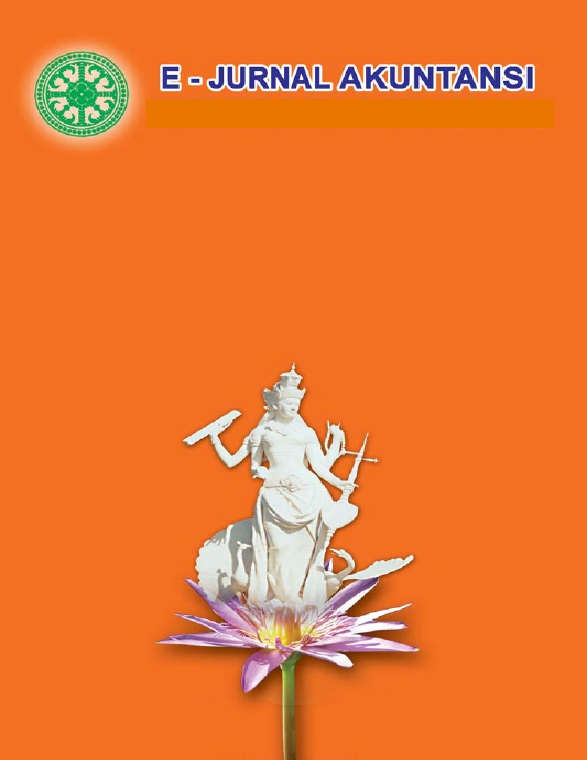Kualitas Laporan Keberlanjutan: Eksistensi dari Media dan Industri
Abstract
The purpose of this study is to determine the effect of media and industry to the quality of sustainability report disclosure. Media is identified by online and social media. The amount of unfavorable news stories in Kompas and Detik is used to quantify online media. The amount of likes, comments, and tweets on Facebook, Twitter, and Instagram is used to quantify social media. The term industry refers to the sort of industry. GRI G4 Index is used to assess the sustainability report's disclosure. This study employs 37 firms as a sample that have gone public and are listed on the BEI in 2017-2020. Purposive sampling is used to determine the sample size. The data analysis technique in this study uses multiple linear regression. The study's findings indicate that online media, social media, and industry type all have a major impact on the quality of sustainability report disclosure.
Keywords: Sustainability Report Disclosure; Online Media; Social Media; Type Of Industry.
Downloads
References
Aulia, Adistira, S., & Syam, D. (2013). Pengaruh Karakteristik Perusahaan Terhadap Praktek Pengungkapan Sustainability Report dalam Laporan Tahunan Perusahaan Publik di Indonesia. Jurnal Reviu Akuntansi Dan Keuangan, 3(1). https://doi.org/http://dx.doi.org/10.22219/jrak.v3i1.1474
Ballesteros Cuadrado -, B., Frías-Aceituno, J., & Martínez-Ferrero, J. (2014). The role of media pressure on the disclosure of sustainability information by local governments. Online Information Review, 38(1), 114–135. https://doi.org/10.1108/OIR-12-2012-0232
Deegan, C., & Unerman, J. (2006). Financial Accounting Theory. McGraw-Hill Education.
Dyllick, T., & Hockerts, K. (2017). Beyond the business case for corporate sustainability. Corporate Environmental Responsibility, 141, 213–224. https://doi.org/10.4324/9781315259277-7
Freeman E., R. (2004). The Stakeholder Approach Revisited. Zfwu Zeitschrift Für Wirtschafts- Und Unternehmensethik, 5(3), 228–241. https://doi.org/https://doi.org/10.5771/1439-880x-2004-3-228
Ghozali, I. (2016). Aplikasi Analisis Multivariate dengan Program IBM SPSS 23. Universitas Diponegoro.
GRI. (2016). Global Reporting Initiative G4 Pedoman Pelaporan Keberlanjutan. Amsterdam: The Netherlands.
Hamid, S., & Norman, M. T. I. H. S. R. M. A. A. A. (2017). Social Media for Environmental Sustainability Awareness in Higher Education. International Journal of Sustainability in Higher Education, 15(4), 390–403. https://doi.org/10.1108/IJSHE-01-2015-0010
KR. (2020). Garudafood, Indofood, dan Wings digugat Rp4 miliar karena dinilai merusak lingkungan. https://www.idnfinancials.com/id/news/36290/garudafood-indofood-wings-facing-lawsuit-surabaya
Lodhia, S., Kaur, A., & Stone, G. (2020). The use of social media as a legitimation tool for sustainability reporting: A study of the top 50 Australian Stock Exchange (ASX) listed companies. Meditari Accountancy Research, 28(4), 613–632. https://doi.org/10.1108/MEDAR-09-2019-0566
Lodhia, S., Stone, G., & Parker, L. (2017). Strategising for social media: A public accounting practice perspective. CPA Australia. https://apo.org.au/sites/default/files/resource-files/2016-06/apo-nid66172.pdf
Manetti, G., & Bellucci, M. (2016). The use of social media for engaging stakeholders in sustainability reporting. Accounting, Auditing and Accountability Journal, 29(6), 985–1011. https://doi.org/10.1108/AAAJ-08-2014-1797
Nazari, J. A., Herremans, I. M., & Warsame, H. A. (2015). Sustainability reporting: External motivators and internal facilitators. Corporate Governance (Bingley), 15(3), 375–390. https://doi.org/10.1108/CG-01-2014-0003
NCSR. (2021). National Center for Sustainability Reporting. https://www.ncsr.id/
Reilly, A. H., & Hynan, K. A. (2014). Corporate communication, sustainability, and social media: It’s not easy (really) being green. Business Horizons, 57(6), 747–758. https://doi.org/10.1016/j.bushor.2014.07.008
Sekaran, U., & Bougie, R. (2016). Research Methods for Business (Seventh Ed). John Wiley & Sons Ltd. https://doi.org/10.1007/978-94-007-0753-5_102084
Sinaga, K. J., Akuntansi, J., Ekonomi, F., & Semarang, U. N. (2017). The Effect of Profitability, Activity Analysis, Industrial Type and Good Corporate Governance Mechanism on The Disclosure of Sustainability Report. Accounting Analysis Journal, 6(3), 347–358. https://doi.org/10.15294/aaj.v6i3.18690
Suhendar, D., & Hakim, D. R. (2021). Pengungkapan Sukarela Berdasarkan Karakteristik Perusahaan dan Kepemilikan Institusional. JABI (Jurnal Akuntansi Berkelanjutan Indonesia), 4(1), 16. https://doi.org/10.32493/jabi.v4i1.y2021.p16-30
Wael Sha Basri, . Mohammed, & Siam, M. R. A. (2019). Social media and corporate communication antecedents of SME sustainability performance. Journal of Economic and Administrative Sciences, 35(3), 172–182. https://doi.org/10.1108/jeas-01-2018-0011
Wijaya, C. (2019). Tumpahan minyak dan gas proyek Pertamina di Laut Jawa: Ribuan karung limbah dan sebabkan warga yang perlu biaya hidup “nganggur.” https://www.bbc.com/indonesia/indonesia-49123606

This work is licensed under a Creative Commons Attribution-ShareAlike 4.0 International License.

















